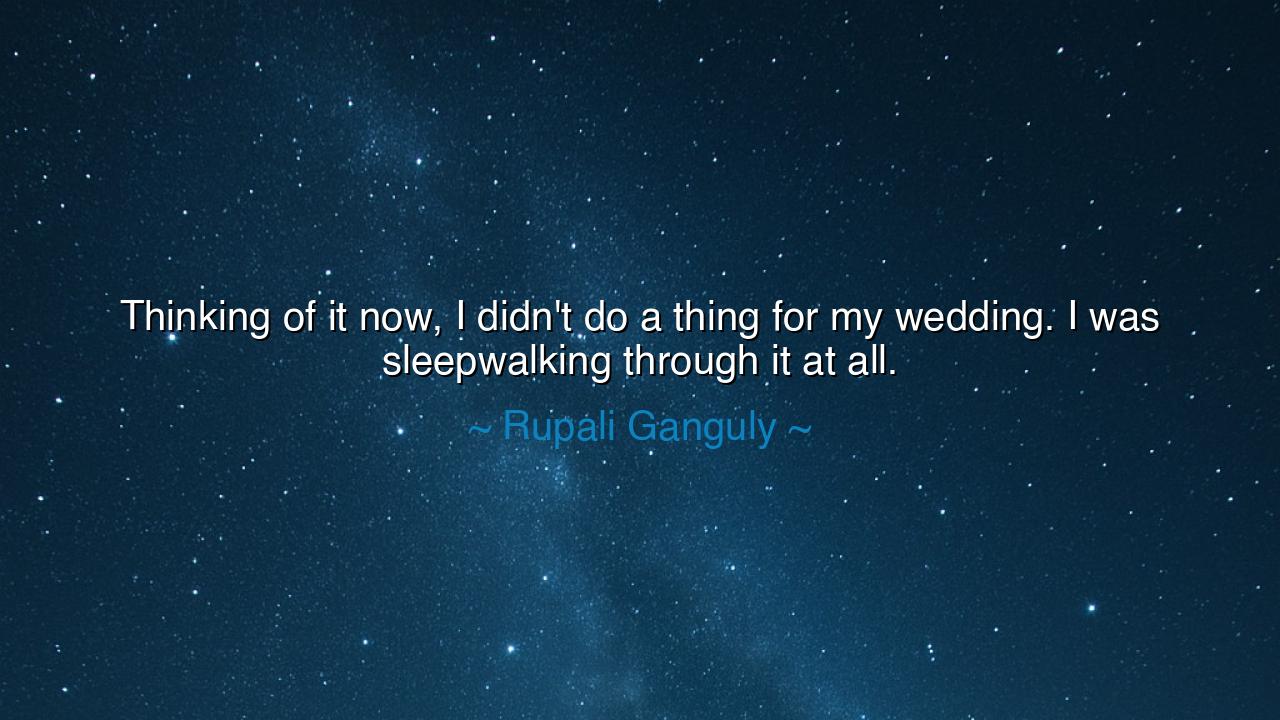
Thinking of it now, I didn't do a thing for my wedding. I was
Thinking of it now, I didn't do a thing for my wedding. I was sleepwalking through it at all.






Rupali Ganguly, with candor and reflection, declared: “Thinking of it now, I didn’t do a thing for my wedding. I was sleepwalking through it at all.” In these words lies the recognition that even life’s greatest milestones can pass in a blur when the heart is overwhelmed, distracted, or surrendered to forces beyond its control. The wedding, often painted as the pinnacle of joy, may at times become a ritual carried out more in motion than in presence, leaving the soul to awaken later and wonder at its own absence.
The ancients, too, spoke of this strange paradox. They warned that when one is consumed by duty, ritual, or expectation, the spirit may retreat, leaving only the body to act. To “sleepwalk” through an event of such magnitude is not idleness but disconnection — a reminder that presence of heart is more precious than grandeur of ceremony. Ganguly’s words echo this truth: that the trappings of tradition mean little if the soul is not awake within them.
History offers us the story of Marie Antoinette, whose wedding to Louis XVI was marked with unimaginable pomp and ceremony. Yet witnesses recorded that the young bride seemed lost amid the weight of ritual and the scrutiny of the court. The splendor of the day could not stir her, for she was but a figure in a play larger than herself. Like Ganguly’s confession, her story reveals how great moments may be lived without truly being felt, when the heart is drowned by expectation.
Her words are also a call to wisdom. To “do nothing” for one’s own wedding is to surrender to the will of others, to let the day unfold as if scripted by hands not your own. The lesson, then, is that in life’s sacred milestones, one must strive to be awake, to claim the day with presence and intention. For a wedding is not for spectacle alone — it is the beginning of a union, and its meaning lies not in performance but in awareness.
Let the generations remember: live fully, even in the midst of duty and ritual. Do not sleepwalk through the hours that shape destiny, for they come but once and cannot be reclaimed. As Rupali Ganguly teaches through her reflection, the true beauty of any wedding lies not in its arrangements but in the heart’s ability to awaken, to breathe deeply, and to stand fully present in love’s most sacred moment.






MTPham Minh Tri
Your reflection on feeling like you were sleepwalking through your wedding is really powerful. It sounds like it might have been an emotionally charged time, making it hard to be fully present. Do you think you were just overwhelmed by the expectations of the day, or was there something else that made it hard for you to connect with the experience?
NBNhon Bao
I can definitely relate to feeling a bit detached during major life events like a wedding. It’s almost like you’re on autopilot with everything happening so quickly. In hindsight, do you think there was a specific reason you felt that way, or was it just the sheer overwhelm of it all? I wonder if you’d do things differently if you had the chance to do it again.
TV30 Phan Thi Thao Vy
It sounds like you were caught up in the whirlwind of wedding preparations and events, which can definitely make you feel disconnected from the moment. Looking back, do you feel like you missed out on experiencing the day fully? Or do you think it’s common for many people to feel detached like that, especially when there’s so much going on around them?
DNDanh Nguyen
It’s interesting that you felt like you were sleepwalking through your wedding. I wonder if weddings, in general, can sometimes become so overwhelming that people lose themselves in the process. Do you think the pressure of everything happening around you might have caused that feeling? How do you feel about weddings now in hindsight—do you wish you had been more present, or does it not matter as much to you?